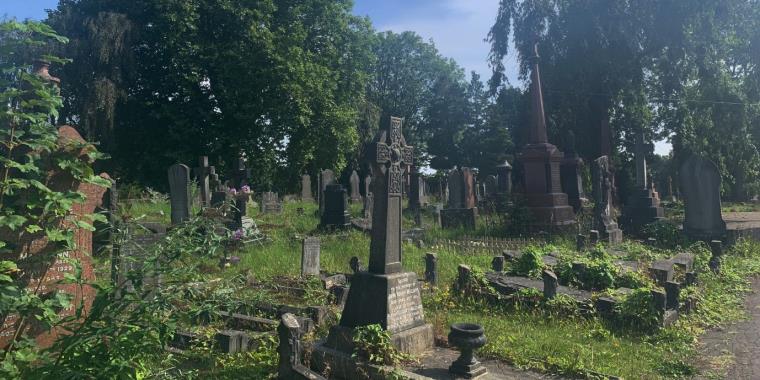Cemeteries offer same benefits as green spaces to urban dwellers, study finds

Cemeteries are just as valuable as green spaces for hundreds of thousands of people across England, new research suggests.
A study by academics at the University of the West of England (UWE Bristol) found that cemeteries provide the only access to doorstep green space for more than a million people in England, and offer many of the same benefits as parks.
Researchers found that cemeteries provide four per cent of accessible green space in England and are particularly important in high-density urban areas where space is limited. In some cities, cemeteries provide a historic setting for events and activities, a space for nature, and opportunities for community involvement, alongside their burial and crematoria services, the study found.
If planned for thoughtfully, the researchers concluded that new cemeteries could be deliberately multifunctional spaces; designed from the outset to provide benefits and functions for people and wildlife, in addition to remembrance. They are calling for new national policy guidance as well as increased funding to understand how cemeteries and green spaces could be planned and managed as more flexible spaces.
Danielle Sinnett, Professor in Sustainable Built Environments at UWE Bristol, said: “Cemeteries can contribute to the network of green spaces in our towns and cities, as places for recreation and nature conservation providing multiple benefits, or ecosystem services, including improved health and wellbeing, flood risk management, improvements in soil, water and air quality, pollination and climate adaptation. Often historically planned to sit on the outskirts of cities, older cemeteries now offer accessible spaces in the neighbourhoods that have grown up around them, where there may be little or no other greenspace, and limited possibilities to provide more.”
For their research, the academics examined the extent to which cemeteries in England provide accessible green space for people and, using Bristol as a case study, explored some of the benefits that they may provide as green spaces.
Using Ordinance Survey green space data, they found that out of the 120,876 green spaces in England, 4,992 are cemeteries (4.1 per cent). The amount of cemetery space in each local authority varies across England, from less than 5 hectares in some areas to 183.5 hectares in Birmingham. The proportion of green spaces that are cemetery space range from 0.24 per cent in West Lancashire to 31.4 per cent in the London Borough of Kensington and Chelsea.
The researchers, from UWE Bristol’s Centre for Sustainable Planning and Environments, found that in Bristol cemeteries are providing important functions as green spaces contributing to walking routes, providing spaces for rest and relaxation, and social interaction. Older cemeteries appeared to be primarily functioning as green spaces, the study found, whereas cemeteries that are (or were until recently) accepting burials appeared to be at more transitional stages providing some limited recreational function. Many cemeteries were providing space for nature with relatively mature trees; and vegetation in cemeteries was likely to be benefiting flood risk mitigation, cooling and air quality, according to the study.
Lead researcher Dr Katie McClymont, Associate Professor in Urban Planning at UWE Bristol, said: “Although the cemeteries we surveyed are providing many of the benefits of green spaces, planners and those managing and promoting these need to be attentive to the potentially competing needs of this ‘multifunctional’ space, such as diverse religious and spiritual practices around death and remembrance. To achieve this, we would like to see national policy guidance as well as increased funding for staff time to understand how cemeteries and green spaces could be planned and managed as multifunctional spaces. We would also like to see green infrastructure strategies incorporate specific proposals for increasing ecosystem service delivery in cemeteries. New cemeteries could also be specifically designed to incorporate features for ecosystem service delivery.”
The full academic research paper is available to view online.
Related news

16 February 2026
UWE Bristol researchers awarded grant to explore impact of asset recovery on offenders
UWE Bristol academics have been awarded funding to explore of the impact of asset recovery on deterring offender behaviour and disrupting crime networks.

10 February 2026
Work by UWE Bristol lecturer features in Government’s National Cancer Plan
Work by a UWE Bristol academic has been included in the Government’s National Cancer Plan.

23 January 2026
On-demand minibus services beneficial in rural areas but face financial challenges, trials suggest
Trials of ‘demand responsive transport’ minibus services boosted connectivity for people in rural and suburban areas, according to a new report produced by UWE Bristol researchers.

18 December 2025
UWE Bristol professor appointed National Institute for Health and Care Excellence CEO
Jonathan Benger CBE, Professor of Emergency Care at UWE Bristol, has been appointed as the new chief executive officer of the National Institute for Health and Care Excellence (NICE).

17 December 2025
Findings revealed from first UK study into experiences of mothers who are survivors of rape pregnancy
UWE Bristol academics have revealed the findings of the first UK-based study of the experiences of mothers who are survivors of rape pregnancy.

11 December 2025
Social media influencer work is far more demanding than it looks, research finds
A study exploring the mental health impacts of social media influencer work has revealed that life online is far more demanding than it appears.

25 November 2025
UWE Bristol experts join film Q&A exploring music and melodrama
Academics will take part in the Cary Comes Home Festival, with a post-screening Q&A exploring music, melodrama and emotional storytelling in classic cinema.

17 November 2025
Urgent reform needed to support ambulance-delivered end of life care, study finds
More than three quarters (78 per cent) of paramedics sometimes fear doing the wrong thing when caring for people in the last year of life, new research has found.

13 November 2025
Bristol’s screen industry experiences “boom-and-bust cycle” after post-pandemic recovery, new research from UWE Bristol finds
New research from UWE Bristol provides detailed insight into Bristol's screen sector.

13 November 2025
New AI research to revolutionise animal welfare
A UWE Bristol research project will combine behavioural science and AI to create technology that understands not only what animals do, but how they feel.

10 November 2025
Lessons from Low Traffic Neighbourhoods will drive better public engagement, study finds
Lessons from Low Traffic Neighbourhoods have informed a new toolkit to improve engagement with the public on challenging local street issues.

06 November 2025
First-of-its-kind study aims to help more people spend their final days at home
A new study will explore how architectural design could support end-of-life care in domestic settings.






